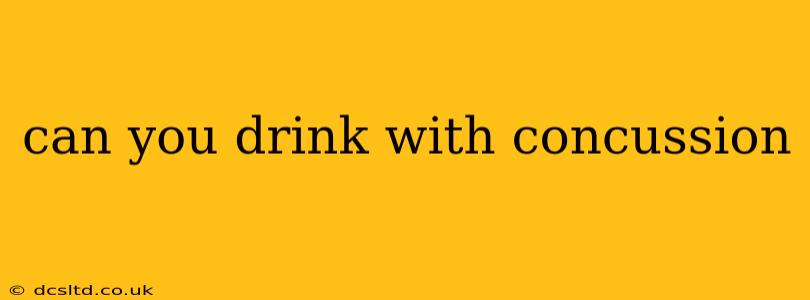A concussion, also known as a mild traumatic brain injury (mTBI), is a serious injury that requires careful management. One frequently asked question surrounding concussion recovery is whether alcohol consumption is permissible. The short answer is a resounding no. Drinking alcohol while recovering from a concussion can significantly hinder the healing process and potentially worsen the symptoms.
This article delves into the reasons why alcohol and concussions are a dangerous mix, exploring the potential consequences and offering guidance on supporting brain recovery.
Why Should You Avoid Alcohol After a Concussion?
Alcohol is a depressant, meaning it slows down brain activity. After a concussion, your brain is already vulnerable and trying to repair itself. Introducing alcohol further depresses brain function, potentially leading to:
- Prolonged Recovery Time: Alcohol interferes with the brain's natural healing process, potentially extending the duration of symptoms like headaches, dizziness, and cognitive difficulties.
- Increased Risk of Complications: Research suggests that alcohol consumption after a concussion might increase the risk of developing post-concussion syndrome (PCS), a condition characterized by persistent symptoms that can last for weeks, months, or even years.
- Exacerbated Symptoms: Alcohol can worsen existing concussion symptoms, making it harder to manage daily activities and increasing discomfort. This includes intensifying headaches, nausea, and sleep disturbances.
- Impaired Cognitive Function: Alcohol further impairs cognitive function, which is already affected by a concussion. This can lead to difficulties with memory, concentration, and decision-making.
- Increased Risk of Secondary Injury: While less direct, impaired judgment from alcohol consumption could increase the risk of accidental injury or falls, potentially leading to a second head injury.
What are the Symptoms of a Concussion?
Recognizing the symptoms of a concussion is crucial for appropriate management and recovery. Symptoms can vary from person to person but may include:
- Headache: Often the most prominent symptom.
- Dizziness: Feeling unsteady or lightheaded.
- Nausea and Vomiting: Gastrointestinal distress.
- Sensitivity to Light and Sound: Photophobia and phonophobia.
- Cognitive Difficulties: Problems with memory, concentration, and decision-making.
- Sleep disturbances: Difficulty sleeping or excessive sleeping.
- Mood changes: Irritability, anxiety, or depression.
- Blurred vision: Difficulty focusing or seeing clearly.
If you suspect you have a concussion, seek medical attention immediately. A medical professional can provide a proper diagnosis and recommend the best course of action.
How Long Should You Avoid Alcohol After a Concussion?
There's no set timeframe for when it's safe to resume alcohol consumption after a concussion. The duration depends on the severity of the injury and individual recovery progress. It's always best to err on the side of caution and completely abstain from alcohol until you've received medical clearance from your doctor. Your doctor can assess your progress and advise you when it might be safe to consider moderate alcohol consumption, if at all.
What Other Substances Should I Avoid After a Concussion?
Besides alcohol, it's also essential to avoid other substances that can affect brain function during recovery. This includes:
- Illegal drugs: These can severely impair brain function and recovery.
- Over-the-counter medications: Some medications can interact negatively with concussion recovery. Always consult your doctor before taking any medications.
- Excessive caffeine: While caffeine itself isn't as directly detrimental as alcohol, excessive consumption can exacerbate anxiety and sleep disturbances, already common concussion symptoms.
Can I Drink Coffee After a Concussion?
The impact of caffeine after a concussion is less clear-cut than alcohol. Moderate caffeine intake might not pose a significant risk, but excessive consumption could worsen existing symptoms like anxiety and sleep problems. It’s best to limit your caffeine intake and consult with your healthcare professional about the appropriate amount for you.
Conclusion: Prioritize Brain Health
Prioritizing brain health after a concussion is paramount. Abstaining from alcohol during recovery is a crucial step to ensure a complete and safe healing process. Always consult with a healthcare professional for personalized guidance and to determine the appropriate course of action based on your specific situation. They can help you navigate your recovery and address any concerns you may have. Remember, your brain's health is a priority, and making informed choices will significantly contribute to a successful recovery.
